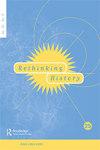Covid-19, online workshops, and the future of intellectual exchange
IF 0.8
2区 历史学
Q1 HISTORY
引用次数: 5
Abstract
ABSTRACT Covid-19 disrupted the fabric of academic collaboration. Scholars cancelled or delayed in-person talks, seminars, and conferences in an effort to reduce transmission of the virus. In many instances, the academic profession turned to various online platforms to share ideas. What are the possible long-term consequences of this development? Drawing on the experience of organizing an online workshop for early career researchers in modern British history, this article argues that virtual seminars and conferences should become a permanent part of intellectual exchange. This article provides practical guidance to others seeking to establish similar projects within and beyond the historical profession. It uses survey material from workshop presenters and attendees to assess the challenges and merits of using online platforms, and then discusses their longer term significance. Despite some drawbacks in their operation, online platforms offer advantages that include widening participation and responding to the climate crisis. Virtual collaboration facilitates the participation of scholars normally excluded from central field discussions due to location, expense, or institutional status, and it also furthers global scholarly interactions without generating a significant carbon footprint. This article argues that rather than a temporary stop-gap during a pandemic, online seminars present new opportunities for the future of collaboration if embedded as part of a mix with of in-person events. In its conclusion, it presents five proposals for improving virtual collaboration in the future.2019冠状病毒病、在线研讨会以及知识交流的未来
Covid-19破坏了学术合作的结构。学者们取消或推迟了面对面的演讲、研讨会和会议,以减少病毒的传播。在很多情况下,学术界转向各种在线平台来分享观点。这种发展可能带来的长期后果是什么?本文借鉴为英国现代史上早期职业研究者组织在线研讨会的经验,认为虚拟研讨会和会议应该成为知识交流的永久组成部分。本文为寻求在历史专业内外建立类似项目的其他人提供了实用的指导。它使用研讨会主持人和与会者的调查材料来评估使用在线平台的挑战和优点,然后讨论它们的长期意义。尽管在线平台在运营上存在一些缺陷,但它在扩大参与和应对气候危机等方面具有优势。虚拟协作促进了通常由于地理位置、费用或机构地位而被排除在中心领域讨论之外的学者的参与,并且它还在不产生显著碳足迹的情况下进一步促进了全球学术互动。本文认为,在线研讨会不是大流行期间的临时权宜之计,如果作为现场活动组合的一部分,将为未来的合作提供新的机会。在结论部分,本文提出了未来改进虚拟协作的五项建议。
本文章由计算机程序翻译,如有差异,请以英文原文为准。
求助全文
约1分钟内获得全文
求助全文
来源期刊

Rethinking History
Multiple-
CiteScore
1.20
自引率
0.00%
发文量
26
期刊介绍:
This acclaimed journal allows historians in a broad range of specialities to experiment with new ways of presenting and interpreting history. Rethinking History challenges the accepted ways of doing history and rethinks the traditional paradigms, providing a unique forum in which practitioners and theorists can debate and expand the boundaries of the discipline.
 求助内容:
求助内容: 应助结果提醒方式:
应助结果提醒方式:


